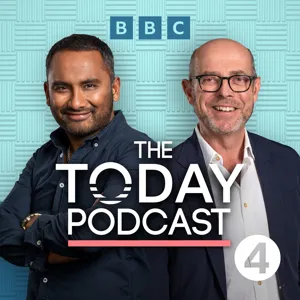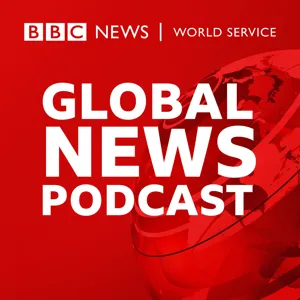Podcast Summary
Military operations in Gaza, evacuation orders, and conflict between Ukraine and Russia: Intense military operations in Gaza cause destruction and humanitarian crisis, evacuation orders force civilians to leave homes, and conflict between Ukraine and Russia continues to fuel tension
The situation in Gaza remains volatile and dangerous for civilians, with intense military operations leading to widespread destruction of infrastructure and a humanitarian crisis. The recent evacuation order from the Israel Defense Forces has added to the chaos, forcing civilians to leave their homes and face an uncertain future. Meanwhile, the strategic importance of the region continues to fuel conflict between Ukraine and Russia. Elsewhere, the disappearance of vultures in India has had unintended consequences, leading to the deaths of hundreds of people due to the disruption of the food web. In business news, partnering with Bank of America can provide exclusive digital tools, award-winning insights, and powerful solutions to help businesses capitalize on opportunities and navigate challenges.
Devastating situation in Gaza: Over a million people potentially displaced: The ongoing conflict between Israel and Palestinians in Gaza has resulted in a potentially displaced population of over a million people, with no clear solution in sight due to political and logistical challenges, and the intense bombing making it dangerous for civilians to leave.
The ongoing conflict between Israel and Palestinians in Gaza has resulted in a devastating situation with over a million people potentially displaced, but with no clear solution in sight due to various political and logistical challenges. The situation is further complicated by the fact that even if people wanted to leave, they may not be able to due to the intense bombing and lack of safety. Hospitals are overflowing with casualties, and even journalists, who would typically report on such events, are unable to do so due to the danger. The situation has led to massive displacement, with large numbers of people seeking shelter in overcrowded homes and buildings. Despite Israel's claims of targeting Hamas and their infrastructure, civilians and civilian structures, including hospitals, mosques, and residential buildings, have been hit. The fog of war and the difficulty of verifying information further complicates the situation, leaving many unsure of what is real and what is fake. The situation in Gaza is one of the most densely populated places in the world, making the potential humanitarian consequences even more dire.
Tensions in Gaza and Middle East, Russia-Ukraine Conflict: The Middle East remains volatile with potential for further escalation in Gaza and ongoing tensions between Russia and Ukraine. Stay informed and prepared for potential developments.
The situation in Gaza and the Middle East as a whole remains volatile and tense, with the potential for further escalation. The Israeli army has reportedly used mosques as hiding places for weapons and fighters, leading many to fear a ground offensive into Gaza. Javara, a woman we've been speaking to in Gaza, has been affected by the ongoing conflict and has expressed fear and exhaustion. Meanwhile, tensions between Russia and Ukraine continue to escalate, with recent attacks on infrastructure in Crimea. These events serve as reminders of the complex and dangerous geopolitical landscape in the region. It's important for individuals and businesses to stay informed and prepared for potential developments. In other news, Economist Podcasts Plus, a new subscription service, is launching on October 24th, offering exclusive digital tools and insights for businesses.
Ukraine Challenging Russia's Control of the Black Sea: Ukraine effectively challenges Russia's control of the Black Sea with strategic strikes using homemade drones, missiles, and foreign military support, sinking or damaging at least 19 Russian warships since April 2022, and forcing Russian fleet to change operational behavior.
Ukraine is effectively challenging Russia's control of the Black Sea through a series of strategic strikes using a combination of homemade drones, missiles, and foreign military support. These attacks are not just focused on Crimea, but also on denying Russia a monopoly of the sea and regaining control of vital shipping routes. Despite not having a navy, Ukraine has registered significant success, having sunk or damaged at least 19 Russian warships since the sinking of the Moskva in April 2022. These strikes have forced the Russian fleet to change its operational behavior, moving away from the northwestern Black Sea and hiding at the southern and eastern shores of Crimea. The use of deep strike drones has been a game-changer for Ukraine, allowing it to compete with Russia's air capabilities and outperform it in deep strike capabilities in the sea. Ukraine's ongoing counteroffensive in the Zaporozhye region is also contributing to this success, as Crimea serves as a staging post and logistical hub for Russian defense there.
Ukraine's Naval Evolution in Conflict with Russia: Ukraine asserts control over waters, Russia responds with attacks; Deep sea shipping crucial for both economies; Russia remains dominant power in Black Sea
Ukraine's naval capabilities have significantly evolved in its conflict with Russia, with new weapons and strategies coming into play. This includes underwater drones, cruise missiles, and a bold move to open a sea corridor for grain exports out of Odesa. Deep sea shipping is crucial for Ukraine's economy and war effort, and Russia's response has included attacks on Ukrainian port infrastructure and adjustments to its naval posture. While Russia still holds the upper hand in the Black Sea, the situation could rapidly change if the conflict escalates, as both sides rely on the Black Sea for their export economies. Ukraine's efforts to assert control over its waters could be seen as a potential threat to Russia's hold on Crimea, but it's important to note that Russia remains the dominant power in the region.
The loss of seemingly insignificant species can have far-reaching consequences: The extinction of seemingly insignificant species can lead to human mortality, economic instability, and conflict.
The health and well-being of ecosystems and human populations can be intricately linked, and the loss of seemingly insignificant or "ugly" species can have far-reaching consequences. The collapse of vulture populations in India, for instance, led to an increase in human mortality due to the proliferation of diseases carried by scavenging animals that filled the void left by the vultures. Similarly, the ongoing conflict between Russia and Ukraine in the Black Sea could negatively impact trade and have ripple effects on various economies. In both cases, the importance of preserving diverse ecosystems and preventing the extinction of seemingly insignificant species cannot be overstated. The loss of vultures resulted in a significant increase in human deaths, while the instability in the Black Sea could lead to economic instability and potentially even conflict. These examples highlight the interconnectedness of various systems and the importance of considering the potential consequences of actions on multiple levels.
The vulture population collapse due to diclofenac use: The use of diclofenac and similar drugs led to vulture population collapse, emphasizing the importance of keystone species conservation
The use of the anti-inflammatory drug diclofenac for treating cattle in India in 1994 led to the dramatic collapse of vulture populations due to kidney failure in the birds. The damage was not identified until years later, and by the time a ban on the drug was implemented in 2006, the populations had already been severely impacted. The long breeding cycle and the continued use of similar drugs make reviving the population a significant challenge. This incident serves as a reminder of the importance of keystone species, like vultures, which play crucial roles in maintaining ecosystems. Despite the damage, efforts are being made to revive the population, but it's unlikely that they will ever reach their previous levels. The lesson here is that we must take the conservation of keystone species more seriously in a world with limited resources.
Reflecting on our aspirations and the power to make a difference: Consider your desires and goals, recognizing the power within to make a positive impact, and take action towards personal and societal change.
During our discussion, we touched upon the concept of having the power to do something. This idea was presented in the context of a question posed by Bank of America, NA, asking "What would you like the power to do?" This question invites us to reflect on our desires, aspirations, and goals. It encourages us to think about the things we wish we could accomplish, change, or create in our lives. This could range from personal goals like improving our health or relationships, to larger societal or global aspirations like reducing poverty or addressing climate change. The power to do something can also be seen as a call to action. It reminds us that we all have the ability to make a difference, no matter how small. Whether it's through our daily actions, our choices, or our contributions, we have the power to make a positive impact on ourselves and those around us. Furthermore, having the power to do something can also be a source of motivation and inspiration. It can help us overcome challenges and obstacles, and keep us focused on our goals. It can also serve as a reminder that we are not powerless in the face of adversity, but rather have the ability to shape our own lives and the world around us. In summary, the power to do something is a powerful concept that encourages us to reflect on our aspirations, take action towards our goals, and recognize the impact we can have on ourselves and the world.






